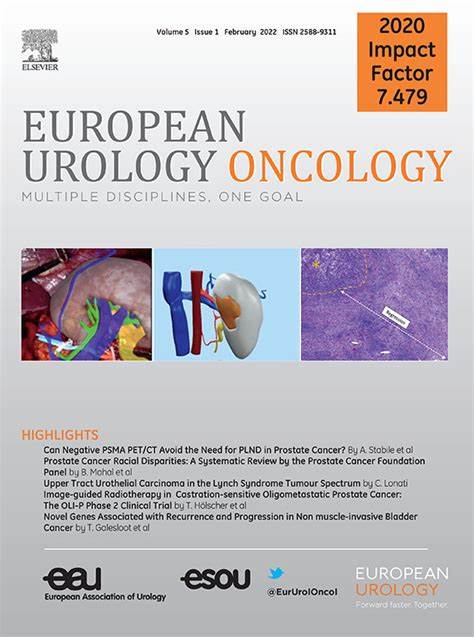Eliciting the Impact of Metformin and Statins on Prostate Cancer Outcomes from a Real-life National Database Analysis
IF 9.3
1区 医学
Q1 ONCOLOGY
引用次数: 0
Abstract
Several large analyses have revealed contradictory results regarding the association between prostate cancer (PC) survival and the use of statins prescribed for prevention of dyslipidaemia or atherosclerosis complications, or of metformin prescribed for type 2 diabetes (T2D). Using data collected between 2006 and 2018 in French national health databases for 521 052 men with PC and 1 827 345 men without PC, we evaluated current evidence regarding overall survival for men with PC according to statin and/or metformin use. The highest mortality was observed in PC patients exposed to both statins and metformin (hazard ratio [HR] 2.29, 95% confidence interval [CI] 2.25–2.33). However, for patients whose first PC treatment was androgen deprivation therapy, a protective effect was observed for statin alone exposure (HR 0.91, 95% CI 0.88–0.93) and combined statin and metformin exposure (HR 0.86, 95% CI 0.85–0.87), whereas men with metformin exposure alone had higher mortality (HR 1.07, 95% CI 1.03–1.11) in comparison to non-users. This protective effect of statins was not observed for PC patients treated with radical prostatectomy. The result was confirmed using causal analysis in a Bayesian network, followed by semantic elicitation using generative artificial intelligence that compiles web-based human knowledge and dedicated literature.
从一个真实的国家数据库分析中得出二甲双胍和他汀类药物对前列腺癌预后的影响。
几项大型分析揭示了前列腺癌(PC)生存率与使用他汀类药物预防血脂异常或动脉粥样硬化并发症或使用二甲双胍治疗2型糖尿病(T2D)之间的相互矛盾的结果。利用2006年至2018年在法国国家健康数据库中收集的521052名PC男性和1827345名非PC男性的数据,我们根据他汀类药物和/或二甲双胍的使用评估了目前关于PC男性总生存率的证据。同时暴露于他汀类药物和二甲双胍的PC患者死亡率最高(风险比[HR] 2.29, 95%可信区间[CI] 2.25-2.33)。然而,对于首次PC治疗为雄激素剥夺治疗的患者,观察到他汀类药物单独暴露(HR 0.91, 95% CI 0.88-0.93)和他汀类药物联合二甲双胍暴露(HR 0.86, 95% CI 0.85-0.87)具有保护作用,而单独暴露二甲双胍的男性与非使用者相比死亡率更高(HR 1.07, 95% CI 1.03-1.11)。他汀类药物在根治性前列腺切除术的前列腺癌患者中未观察到这种保护作用。结果通过贝叶斯网络中的因果分析得到证实,随后使用生成式人工智能进行语义提取,该人工智能编译基于网络的人类知识和专用文献。
本文章由计算机程序翻译,如有差异,请以英文原文为准。
求助全文
约1分钟内获得全文
求助全文
来源期刊

European urology oncology
Multiple-
CiteScore
15.50
自引率
2.40%
发文量
128
审稿时长
20 days
期刊介绍:
Journal Name: European Urology Oncology
Affiliation: Official Journal of the European Association of Urology
Focus:
First official publication of the EAU fully devoted to the study of genitourinary malignancies
Aims to deliver high-quality research
Content:
Includes original articles, opinion piece editorials, and invited reviews
Covers clinical, basic, and translational research
Publication Frequency: Six times a year in electronic format
 求助内容:
求助内容: 应助结果提醒方式:
应助结果提醒方式:


